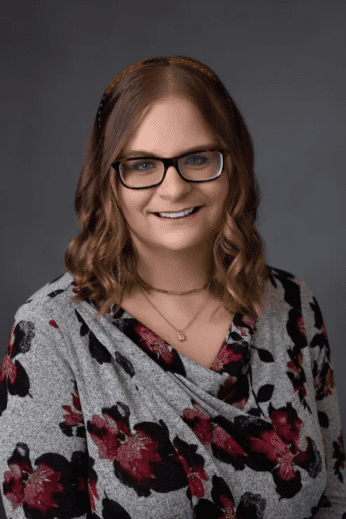Katie was diagnosed Autistic after completing her Master’s degree and adjusted everything from her relationships to career path. Katie equips neurodivergent adults to confidently live in a way that honors how their brain works and create a life they don’t need to escape from by utilizing her education, lived experience, and clinical background as an addiction counselor. Katie is becoming who her younger self needed. (Neurodivergent = Autistic, ADHD/ADD, Sensory Processing Needs, Learning Disabilities, and Traumatic Brain Injury)
Katie’s Autism diagnosis in 2018 took her on a self-discovery journey. It was throwing grief, acceptance, relief, and joy in a blender. She was thankful for a diagnosis because now there were names for her experiences. After experiencing seizures, panic attacks, and Autism in the same lifetime Katie saw similarities when it comes to experiencing overload and the body feeling out of control. Since she was not diagnosed Autistic until after completing her Masters degree in Forensic Psychology, Katie spent years not knowing why she was different. Alcoholism also impacted family dynamics most of her life so that provided what she believes is a second baseline for her beliefs, behaviors, and patterns. The first baseline being undiagnosed Autism.
After going through and reporting dating violence in middle school started by coercion and difficult social realities, Katie had a full set of PTSD and started a ten year on and off journey of psychiatric medication. In seventh grade, Katie was perfectly fine with her best friend leaving to join the school bully because she rationalized why the school bully was a better fit for friendship and just tolerated it having full belief that life would work itself out and that her friend would come back to her. This is high empathy but also believing the best about people which in this case ended up being to her detriment. Both are actually big parts of Autism and neurodivergence in general that gets socially applauded as a superpower.
Since Katie never walked through life with additional intentions, it was quite difficult to cope with when she experienced manipulative people in life. All through school Katie never stuck with a friend group, and had a quiet but fierce and persistent commitment to include people that were left out. In high school Katie’s best friends were a grade older and did not really fit the social mold either in their own way. As an adult in the world, most of her friends are 10+ years older – and she is perfectly happy with that.
Starting in high school Katie began absorbing the leadership roles available in her family, academic, and social life because she loved the structure of knowing what to expect. Katie wasn’t diagnosed Autistic until into her adulthood because she was compliant, cordial, and confident in her leadership and her social caretaking strategies kept her alive through the hardest points in her life. Katie had a period of three years binge drinking and a period of nine years struggling with disordered eating behaviors. Both binge drinking and disordered eating were emotional avoidance, muting herself when she should have spoken up, and coping with what she now know was undoubtedly overload and overstimulation.
After Katie went through grieving the support she could have had, there was significant tear shed because she was relieved that she finally knew how to rewrite her narrative. This empowered her to manage situations that previously caused her to engage in binge drinking and disordered eating.
Katie has created a Focus 4 Approach in response to learning how Autism impacted her social reality. The Focus Four Approach is (1) Self-Advocacy (2) Somatic Peace (3) Dignity Preserving Conflict Resolution, and (4) Emotion Regulation + Expression. This has been extremely effective for her, so these four things are in her relapse prevention plan. Katie implements her Focus 4 Approach in sessions with her own therapist and that has kept her out of outpatient, inpatient, or residential treatment for disordered eating and kept her from relapsing with binge drinking.
Through Katie’s GURU hours she will empower and equip more neurodivergent adults to live in a way that honors how their brain works and create a life they do not need to escape from. Katie is becoming who she needed when she was younger and equips other neurodivergent adults to do the same.
* Katie provides non-clinical support as she is not licensed as a mental health clinician, she does not provide crisis counseling, legal advice, or medical advice.*
You may want to ask Katie questions related to:
1) I was not diagnosed until adulthood, so I never received any specific support, how do I ask for help without getting in my own way?
2) How do I establish and stick with new boundaries for this stage of life?
3) How do I have a boundary setting or self-advocacy related conversation that requires courage and/or vulnerability?
4) How do I find and keep value aligned friends if I don’t do big crowds or small talk?
5) How can I protect my mental health when there is a big change in my life – big changes are harder for me than others.
Learn more about Katie or connect with her during her GURU hours, in-person at Hera Hub Irvine every 1st and 3rd Tuesday from 5pm-7pm.
Email: hopereignitedconsulting@gmail.com
Website: www.hopereignitedconsulting.com

